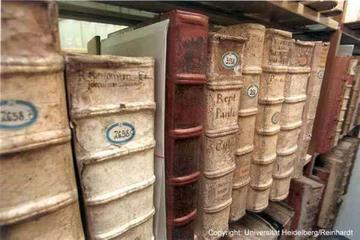Romance Studies: Portuguese

Course outline
Course structure
Main research interests
Formal requirements
Academic advisor
Contact
| Degree | Bachelor of Arts |
| Application | not required |
| Course commences | winter semester / summer semester |
| Standard course duration | 6 semesters |
| Focus options | 25% |
| Language requirements | none |
| Language of instruction | German and Portuguese; examinations held in Portuguese |
Note for prospective students interested in coming to Heidelberg University to take the Teaching Degree course qualifying its graduates to teach at higher secondary (grammar) schools (Gymnasien) in Germany:
In accordance with the statutory provisions laid down by the State of Baden-Württemberg, students wishing to embark as of winter semester 2015/2016 on a Teaching Degree qualifying them to teach at higher secondary (grammar) schools (Gymnasien) in Germany can only do so by enrolling in two-tier courses with a Bachelor/Master structure (polyvalent two-subject (50%) Bachelor programme with a Teaching Degree option; Master of Education course scheduled to start in winter semester 2018/2019).
As of winter semester 2015/2016, the subject described on this page can be studied in a polyvalent two-subject (50%) Bachelor course with a Teaching Degree option. It has to be combined with another 50% subject of relevance for secondary-school education.
For more information, go to https://www.uni-heidelberg.de/studium/zlb/
Note for students already enrolled in a Teaching Degree course in the framework of the Examination Regulations for Teachers at Higher Secondary Schools (GymPO I):
In the winter semester 2015/2016 and later, students enrolled by 31 July 2015 in a Teaching Degree course regulated by the provisions of GymPO I (2009) are entitled to switch to a different main subject under the conditions set out in said GymPO provided that the change is in accordance with the statutory provisions.
In this case, the following transitional regulations apply: http://www.uni-heidelberg.de/md/studium/zlb/beratung/150515_gympo-uebergangsregelungen_final.pdf
For more information, go to https://www.uni-heidelberg.de/studium/zlb/
Course outline
Literary studies
Portuguese literary studies consider literary texts from Portugal, Brasil and other Portuguese-speaking countries, from both a synchronic and diachronic perspective. Topics include:
- various aspects and developments in literary history, literary genres and poetics
- various approaches taken within literary theory and media theory
- the interaction between literature and other cultural phenomena, both in the past and in the present day
Linguistics
Topics dealt with in Portuguese linguistics include the following:
- linguistic theories and methods
- the transition from Latin to a Romance language and the development of Portuguese
- the history and global spread of the Portuguese language
- analysis of the Portuguese language system
- (vocabulary, morphology/word formation, grammar, phonetics/phonology)
- language variation and varieties of Portuguese
- Portuguese language contact
- the history, development and description of Portuguese-based creole languages (Creolistics)
- contemporary Portuguese in the globalised world
Cultural studies
Cultural studies is interdisciplinary. Topics such as the following are addressed with a primary focus on Brazil:
- the constitution of Brazil, the country’s development and evolution
- current societal structures and their impact on cultural development
- the role of popular culture and its impact on society
- critical analysis of sociopolitical phenomena in relation to Portuguese-speaking countries
- observation and analysis of society and current political, cultural and epochal realities using media such as film, music and literature.
Language practice
The following areas are among those addressed as part of Portuguese language practice:
- development of basic skills (listening, reading, writing, speaking)
- use of the language as a means of communication in various situations
- further development of grammar skills
- text comprehension and analysis of diverse communication situations, genres and texts of different difficulty levels
Specialised Didactics
Didactics of modern foreign languages currently focusses on the approach taken to improving language skills. Skills are observed, and the features noted then inform steps taken for the targeted improvement of these skills. Following a given period aimed at improving language skills, these are reevaluated and conclusions are subsequently drawn as to how language skills can be efficiently further improved. This process is fully transparent and is carried out with the agreement of learners.
Central to this approach is the improvement of learners’ transversal skills. These build on other basic skills; intercultural skills and text and media analysis skills for example (critical analysis of texts, images etc. in their respective contexts).
Didactics widely refers to the determination of teaching aims, other issues, however, are also addressed. These include the
- improvement of functional communication skills (speaking, writing, listening, reading, speech projection) and the relevant linguistic means;
- the didactic adaptation of literary, cultural and linguistic content to topics taught in skill-orientated courses;
- promoting the development of individual learners;
- differentiating between heterogeneous groups of learners;
- supporting learners throughout learning and construction processes
Course structure
Pleas see the Module handbook for the B.A. course.
Main research interests
The main research interests in linguistics are:
- the emergence of linguistic territories in the Latin/Romance area as a whole; history of Spanish, Catalan, Portuguese and Galician on the Iberian Peninsula and overseas, notably in America; history of everyday Italian; synchronic and diachronic investigations on syntax, semantics and word formation in the Romance languages
- varieties of present-day French and of Italian from the 18th century to the present; spoken and written language
- dialectology and sociolinguistics of southern Italy, language geography, notably geolinguistic investigations on the Campagna region; substandard research in conjunction with the eponymous Graduate College
- dictionary projects focusing on Old French, Old Spanish, Old Gascon, Old Occitan
Literary studies are anthropological, poetological and comparative in their approach. Main research interests (in connection with the literary history of all major Romance languages) are:
- Spanish and French literary studies; early modern age to late 17th century and high modernity in the 19th and 20th centuries; general issues in the theory of literature (deconstruction and hermeneutics)
- French and Italian literature from the 18th to the 20th century; literary anthropology with special reference to autobiographical writing in the early modern age; enlightenment in Italy (in conjunction with the Università di Torino); the novella in the 19th and 20th centuries; modern poetry; research on Stendhal (in conjunction with the University of Paris III)
Romance literature outside Europe; Spanish and French literature from Latin America and the Caribbean (with a special focus on cultural studies); literature of the Hispanics/Latinos in the USA
Formalia
Zulassung
There are no access restrictions. For information on how to enrol, click here.
International applicants
There are special regulations for international applicants. For more information, apply to the International Relations Office of Heidelberg University (Seminarstraße 2).
Subject combinations
Possible subject combinations are listed in the Catalogue of Subjects. Combinations of two Romance Studies subjects are possible.
Study and examination regulations
Examination regulations B.A. (26 March 2015)
Examination regulations B.A. (14 June 2010)
Examination regulations B.A. (8 January 2009)
Examination regulations B.A. (only valid up to winter semester 08/09)
Students enrolled before 1 March 2009 can apply for the last named regulations to be declared valid in their case.
Module Handbook
Please click here to find the latest Module Handbook.
Fees
Tuition fees at Heidelberg University are payable at the beginning of each semester.
Academic advisor
Felicia Augusto-Hönicke
Department of Romance Studies, Office 113
phone: +49 (0)6221-54-3597
e-mail: felicia.augusto@rose.uni-heidelberg.de
Please note: Students/applicants requiring counselling will need to enter their names in the lists put up outside the relevant offices for this purpose.
Contact
Department of Romance Studies
Seminarstraße 3
D-69117 Heidelberg
Secretaries
Office 103
phone: +49 (0)6221 542731
e-mail: Alessandra.Acquarone@urz.uni-heidelberg.de
Internet: http://www.uni-heidelberg.de/rose/
Location
Student representation
e-mail: rosig@urz.uni-heidelberg.de

